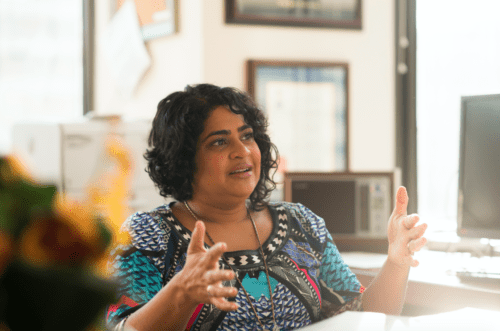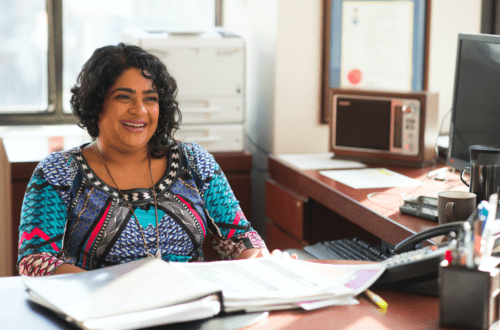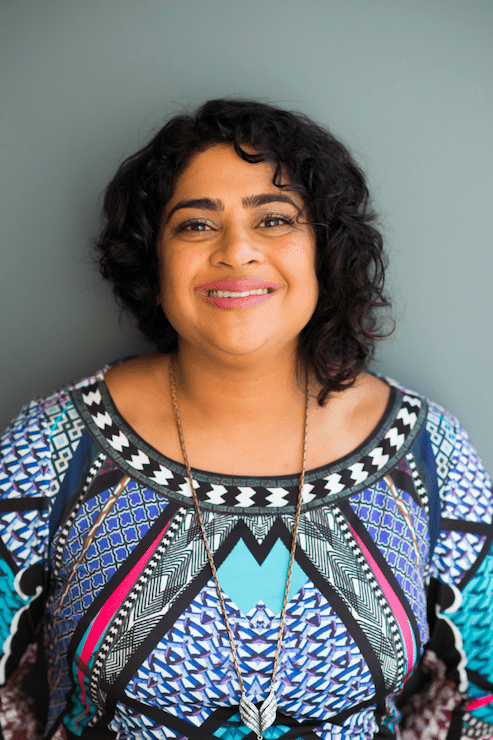For Canada 150, we’ve partnered with photographer Jessica Laforet (founder of This Woman I Know) to profile an eclectic mix of leaders who are spearheading positive change across the country, and inspiring us with their tenacity, grit, compassion, and spirit.
We hope this series not only introduces you to progressive thinkers and doers, but also acts as a catalyst for sparking conversation and debate on what it means to be Canadian. For this installment, we spoke with Renu Mandhane, a human rights lawyer, a mother, and an extremely passionate warrior of social justice and equality.
Renu highly values the role women can play in the public sphere – prioritizing mentorship of young women and promoting their visions for their future. She believes that goal setting for young women is set strongly by the visibility of women in aspirational and challenging roles.
Through her work as Chief Commissioner of the Ontario Human Rights Commission, Renu is dedicated to seeking change and hopes that one day we will all see human rights, equality and social justice as foundational values.
JL: What about Canada makes you proud?
RM: I think Canada is overall a very peaceful place, which is fairly remarkable when you think about the diversity that we have. When that peace is disrupted (like most recently the shooting in Montreal), I think what’s so shocking for Canadians is that it’s so outside our norm and that we’re used to living in relative peace.
The other thing that’s amazing is when I talk to people from other countries, one of the things they find so disorienting is how trusting people are and how many people don’t assume there are ulterior motives in interactions with strangers. I think that’s pretty amazing.
What change would you like to see in the future?
First, I think a culture change where we see human rights, equality, and social justice as foundational values and that actually infuse all our institutions and our relationships.
I really hope to see gains in the next few years in terms of reconciliation with First Nations people: a fairer criminal justice system and an education system that helps and serves the needs of our diverse population. We still see a lot of poverty in our country, and issues of homelessness are acute–and unacceptable–in a country as prosperous as Canada.
What life lesson is currently guiding your journey?
The biggest life lesson I’ve learned is from my children. I’m a very cerebral person in the way I analyze everything. Before them, I spent a lot of my time in my head thinking, “What did that person mean when they said that?” and often having self-doubt. The thing about kids is they live in the present and they demand that you do too. So if you’re mentally not there, they know it and they call you on it and force you to get back in the moment.
That’s the biggest lesson: to live in the moment because so many of our actions are guided by anxiety about the future. So if you can actually put that away, you can live a more authentic life and be less focused on what may happen two hours from now, ten days from now or two years from now.

What’s the best advice for a woman hoping to leave their mark on the world?
To be authentic. To be yourself. In a world that’s really focused on your brand, you can lose yourself in trying to please the others. What I tell people is to be tenacious.
A lot of people ask me, “How did you end up in this position?” and I say I was the last man standing. A lot of my friends wanted to work in human rights but when it didn’t work out, they gave up. I kept pursuing that dream and didn’t give up. It’s not because I was smarter or better; it is purely because I didn’t give up and I was tenacious.
What do you do to recharge your energy?
Not enough!
I read a lot of news. I’m a bit of a news junkie. I’ve realized I need to do that because it’s a huge part of how I connect with the world, so I tell myself it’s okay.
Also hanging out with family and friends. As I get older, I have less time with my friends. I spend a lot of time with my husband, kids and family. But whenever I make that time for my friends, I feel amazing afterwards. Make sure you build in that social time and get back to that core connecting.
What’s a recent discovery that’s captivating your attention?
The relationship with First Nations people. For sure the biggest learning curve over the last year has been trying to understand what reconciliation actually means from the perspective of First Nations people and how important it is for Canada.
Because of my experience as a child of immigrants, I feel there is so much solidarity that could be built between newcomers and First Nations people. Their experiences are often of Colonialism, poverty and dislocation.
I’ve learned so much about my own journey through speaking with First Nations people. Their way of being in the world is often slower and more thoughtful. I’m trying to embrace that slowness, that thoughtfulness. I had a meeting recently and there were about twelve people around the room, mostly First Nations people, and there were a lot of moments of silence. A year ago I would have felt I needed to fill that silence. But being able to be silent and be together and connect in silence has been really powerful and amazing.

In your opinion, how does one build self-confidence?
Everyone has things they would change. It’s about accepting that you can strive to be a better person, but that doesn’t mean you aren’t a good person in the moment.
Every woman looks at themselves and physically judges themselves. I think it’s being able to see yourself more objectively and putting yourself in situations where you see how lucky you are. Wherever you are in life. For me, it was travelling around the provinces seeing people who are living in poverty and don’t have a lot of opportunities. It made me reset and realize I have so much I can offer the world just because of the privilege.
When and how did you know you were on the right path?
I still don’t know if I’m on the right path! There were points in my life I felt I wasn’t on the right path. I remember having a job early in life where I’d meet people and I’d be embarrassed to tell them what I was doing because I didn’t feel like it reflected my true self.
When I started to have pride in what I was doing and the people I was surrounding myself with, that was the moment where I was like, ”Life is pretty good!”
What ritual is important to you?
Coffee at the beginning of the day; wine at the end of day. Netflix. Pretty regular stuff. These little rituals are so simple but they bring so much joy. Appreciate them and how much they enrich your life. It’s that presence: being able to experience those moments of pleasure that aren’t connected to big things.
What are your top three pieces of advice for young women hoping to advance their career?
First: find and cultivate mentors. Find those women you admire, reach out to them and cultivate that relationship because that’ll be essential going forward.
Second: put yourself out there. Women count themselves out a lot, so even [my current job] was posted, it took a friend urging me to apply for me to even think that was possible. So extend yourself out of your comfort zone.
Third: cultivate the things that keep you balanced. If you don’t take that time to be grounded, whatever that means for you, you can’t be your best self in your professional life. I’ve had times where my work has been everything and I’ve not been as good at my job because I’m not taking that time. That was a growing experience.
Check out more from Renu on Twitter.



 Follow Us On Instagram
Follow Us On Instagram
